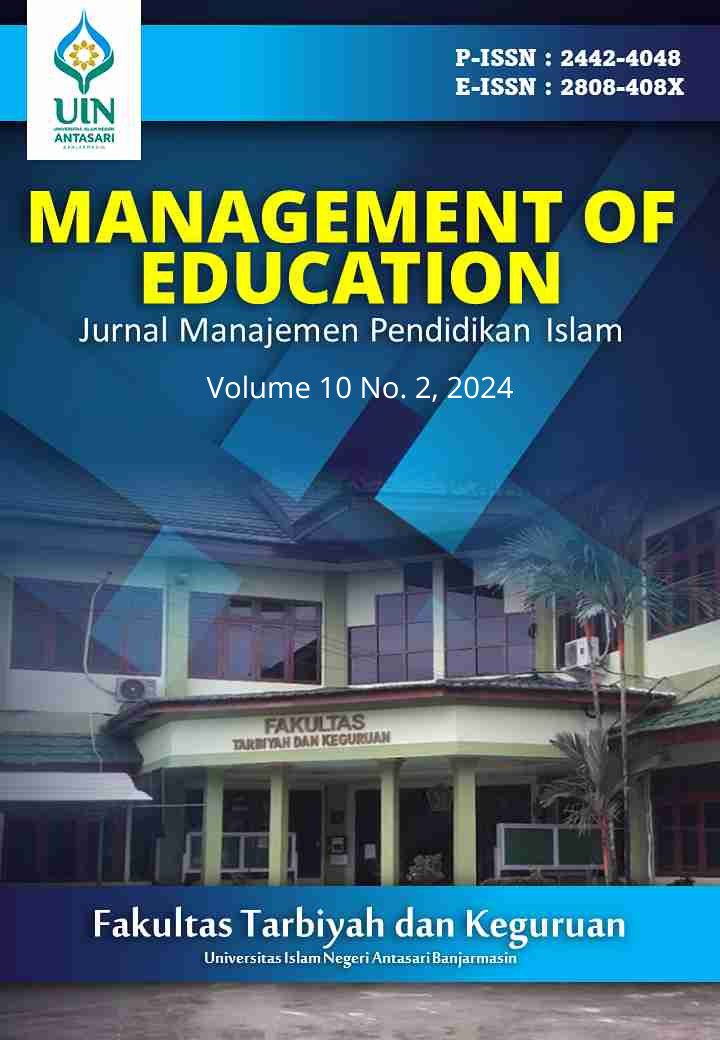Optimalisasi Manajemen Kurikulum Merdeka Belajar di PAUD : Langkah-langkah Praktis
DOI:
https://doi.org/10.18592/moe.v10i2.13618Keywords:
Manajemen, Kurikulum pembelajaran mandiri, Anak Usia DiniAbstract
The change in the 2013 curriculum to an independent learning curriculum is a problem for teachers and schools in implementing it. Implementation of the independent curriculum requires good management so that it can run effectively and efficiently. The aim of this research is to describe the management of the independent learning curriculum in improving school quality at Kindergarten ABA 5 Salatiga. This type of research is descriptive qualitative with interviews, observation and documentation as data collection procedures. Data analysis includes data collection, data reduction, data presentation and drawing conclusions. This research uses triangulation of sources and techniques. The results of this research describe the management of the independent curriculum which is divided into 4 aspects, namely planning, organizing, actuating and controlling (POAC). Planning includes needs analysis, looking for reference sources from seminars, workshops and mentoring as well as creating a curriculum design which includes the preparation of learning administration. Organizing includes the division of tasks, principal and functions consisting of the distribution of teaching schedules, schedules for extracurricular and extracurricular assistance, determining methods, media and learning resources as well as learning assessment. Implementation (actuating) includes learning activities, intracurricular, extracurricular and P5 project activities. Assessment (controlling) includes formative and summative assessments which include input, process and learning output.References
Baderiah. (2018). Pengembangan Kurikulum. Palopo: Lembaga Penerbit Kampus IAIN Palopo.
Hermanu, D. (2003). Pentingnya Penerapan Merdeka Belajar Sejak Dini. 73–78.
Marisa, M. (2021). Inovasi Kurikulum Merdeka Belajar di Era Society 5.0. Santhet, Jurnal Sejarah, Pendidikan Dan Humaniora, 5(1), 66–78. https://doi.org/10.36526/js.v3i2.e-ISSN
Masykur, R. (2019). Teori Dan Telaah Pengembangan Kurikulum. In Aura Publisher. Retrieved from www.aura-publishing.com
Mubarok, R., Sholeh, M., & Irayana, I. (2023). Classroom Management Strategy in Implementing the Merdeka Curriculum (Independent Curriculum) in Primary Education Institutions. Al-Adzka: Jurnal Ilmiah Pendidikan Guru Madrasah Ibtidaiyah, 13(2), 189–202. https://doi.org/10.18952/aladzkapgmi.v13i2.11356
Muhtar, L. H. &. (2009). Dasar-Dasar Manajemen Pendidikan. In Surabaya. FIP UNESA.
Nilawati, T. (2015). Desain Pembelajaran Pendidikan Anak Usia Dini. Bandar Lampung: Aura printing & Publishing.
Nurani, Y. (2013). Konsep Dasar Pendidikan Anak Usia Dini (cetakan ke). Jakarta: PT Indeks.
Prameswari, T. W. (2020). Merdeka Belajar : Sebuah Konsep Pembelajaran Anak Usia Dini Menuju Indonesia Emas 2045. Prosiding Seminar Nasional Penalaran Dan Penelitian Nusantara, 1, 76–86.
Retnaningsih, L. E., & Khairiyah, U. (2022). Kurikulum merdeka pada pendidikan anak usia dini. Seling, Jurnal Program Studi PGRA, 8(1), 143–158.
Salim, & Syahrum. (2012). Metodologi Penelitian Kualitatif. Bandung: Citapustaka Media.
Sarwono, J. (2006). Metode Penelitian Kuantitatif & Kualitatif (Pertama). Yogyakarta: Graha Ilmu.
Sukmadinata, N. S. (2013). Metodologi Penelitian Pendidikan. Bandung: Remaja Rosda Karya.
Suryaman, M. (2020). Orientasi Pengembangan Kurikulum Merdeka Belajar. Prosiding Seminar Daring Nasional : Pengembangan Kurikulum Merdeka Belajar, 13–28.
Wardan, K., & Rahayu, A. P. (2021). Manajemen Kurikulum. Malang: CV. Literasi Nusantara Abadi.
Zakiyah, E., Handayani, T., & Sofyan, F. A. (2019). Analisis Kesulitan Belajar Matematika Materi Operasi Hitung Campuran Siswa Kelas IV di MI Hijriyah II Palembang. Al-Adzka: Jurnal Ilmiah Pendidikan Guru Madrasah Ibtidaiyah, 9(1), 41. https://doi.org/10.18592/aladzkapgmi.v9i1.3006
Downloads
Published
How to Cite
Issue
Section
License
Copyright (c) 2024 Ibdaul Latifah

This work is licensed under a Creative Commons Attribution 4.0 International License.
Authors who publish with this journal agree to the following terms:
- Authors retain copyright and grant the journal right of first publication with the work simultaneously licensed under a Creative Commons Attribution 4.0 International that allows others to share the work with an acknowledgement of the work's authorship and initial publication in this journal.
- Authors are able to enter into separate, additional contractual arrangements for the non-exclusive distribution of the journal's published version of the work (e.g., post it to an institutional repository or publish it in a book), with an acknowledgement of its initial publication in this journal.
- Authors are permitted and encouraged to post their work online (e.g., in institutional repositories or on their website) prior to and during the submission process, as it can lead to productive exchanges, as well as earlier and greater citation of published work.









 This work is licensed under a
This work is licensed under a 